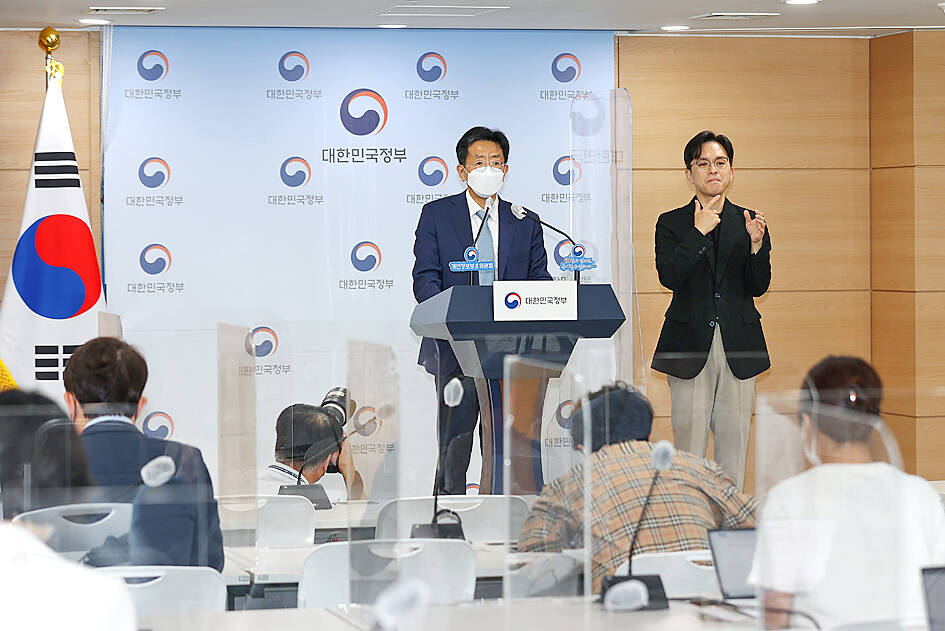South Korea has fined Alphabet Inc’s Google and Meta Platforms Inc more than US$71 million collectively for gathering users’ personal information without consent for tailored ads, regulators said yesterday, the country’s highest-ever data protection fines.
Investigations into the two US technology giants found they had been “collecting and analyzing” data on their users, and monitoring their use of Web sites and applications, the South Korean Personal Information Protection Commission said.
The data was used to “infer the users’ interests or used for customized online advertisements,” the commission said.

Photo: EPA-EFE
Neither Google nor Meta had clearly informed South Korean users of this practice or obtained their consent in advance, the commission added.
As a result, Google was fined 69.2 billion won (US$49.7 million) and Meta 30.8 billion won.
“It is the largest fine for the violation of the Personal Information Protection Act,” the commission said in a statement.
Regulators said that the majority of the users in South Korea — 82 percent for Google and 98 percent for Meta — had unknowingly allowed them to collect data on their online use.
“It can be said that the possibility and the risk of infringement of the rights of the users are high,” the statement said.
Last year, South Korea fined Google nearly US$180 million for abusing its dominance in the mobile operating systems and app markets, saying it was hampering market competition.
Google did not have an immediate comment.
“While we respect the commission’s decision, we are confident that we work with our clients in a legally compliant way that meets the processes required by local regulations,” a Meta spokesperson said.
“As such, we do not agree with the commission’s decision and will be open to all options including seeking a ruling from the court,” the spokesperson added.
Giant US tech companies are regularly criticized for dominating markets by elbowing out rivals, with multiple governments globally seeking to rein them in.
The EU has slammed Google with record antitrust penalties, and also gone after Apple Inc and Microsoft Corp.
Additional reporting by Reuters

TAKING STOCK: A Taiwanese cookware firm in Vietnam urged customers to assess inventory or place orders early so shipments can reach the US while tariffs are paused Taiwanese businesses in Vietnam are exploring alternatives after the White House imposed a 46 percent import duty on Vietnamese goods, following US President Donald Trump’s announcement of “reciprocal” tariffs on the US’ trading partners. Lo Shih-liang (羅世良), chairman of Brico Industry Co (裕茂工業), a Taiwanese company that manufactures cast iron cookware and stove components in Vietnam, said that more than 40 percent of his business was tied to the US market, describing the constant US policy shifts as an emotional roller coaster. “I work during the day and stay up all night watching the news. I’ve been following US news until 3am

UNCERTAINTY: Innolux activated a stringent supply chain management mechanism, as it did during the COVID-19 pandemic, to ensure optimal inventory levels for customers Flat-panel display makers AUO Corp (友達) and Innolux Corp (群創) yesterday said that about 12 to 20 percent of their display business is at risk of potential US tariffs and that they would relocate production or shipment destinations to mitigate the levies’ effects. US tariffs would have a direct impact of US$200 million on AUO’s revenue, company chairman Paul Peng (彭雙浪) told reporters on the sidelines of the Touch Taiwan trade show in Taipei yesterday. That would make up about 12 percent of the company’s overall revenue. To cope with the tariff uncertainty, AUO plans to allocate its production to manufacturing facilities in

Six years ago, LVMH’s billionaire CEO Bernard Arnault and US President Donald Trump cut the blue ribbon on a factory in rural Texas that would make designer handbags for Louis Vuitton, one of the world’s best-known luxury brands. However, since the high-profile opening, the factory has faced a host of problems limiting production, 11 former Louis Vuitton employees said. The site has consistently ranked among the worst-performing for Louis Vuitton globally, “significantly” underperforming other facilities, said three former Louis Vuitton workers and a senior industry source, who cited internal rankings shared with staff. The plant’s problems — which have not

COLLABORATION: Given Taiwan’s key position in global supply chains, the US firm is discussing strategies with local partners and clients to deal with global uncertainties Advanced Micro Devices Inc (AMD) yesterday said it is meeting with local ecosystem partners, including Taiwan Semiconductor Manufacturing Co (TSMC, 台積電), to discuss strategies, including long-term manufacturing, to navigate uncertainties such as US tariffs, as Taiwan occupies an important position in global supply chains. AMD chief executive officer Lisa Su (蘇姿丰) told reporters that Taiwan is an important part of the chip designer’s ecosystem and she is discussing with partners and customers in Taiwan to forge strong collaborations on different areas during this critical period. AMD has just become the first artificial-intelligence (AI) server chip customer of TSMC to utilize its advanced